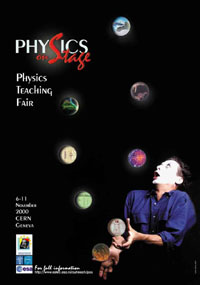CERN, ESA and ESO put Physics on Stage
Geneva, 18 October 2000. Can you imagine how much physics is in a simple match of ping-pong, in throwing a boomerang, or in a musical concert? Physics is all around us and governs our lives. The World-Wide Web and mobile communication are only two examples of technologies that have rapidly found their way from science into the everyday life. But who is going to maintain these technologies and develop new ones in the future? Probably not young Europeans, as recent surveys show a frightening decline of interest in physics and technology among Europe's citizens, especially schoolchildren. Fewer and fewer young people enrol in physics courses at university.
CERN1, ESA and ESO put Physics on Stage
Geneva, 18 October 2000. Can you imagine how much physics is in a simple match of ping-pong, in throwing a boomerang, or in a musical concert? Physics is all around us and governs our lives. The World-Wide Web and mobile communication are only two examples of technologies that have rapidly found their way from science into the everyday life. But who is going to maintain these technologies and develop new ones in the future? Probably not young Europeans, as recent surveys show a frightening decline of interest in physics and technology among Europe's citizens, especially schoolchildren. Fewer and fewer young people enrol in physics courses at university.
The project "Physics on Stage" tackles this problem head on. An international festival of 400 physics educators from 22 European countries gather at CERN in Geneva from 6 to 10 November to show how fascinating and entertaining physics can be. In a week-long event innovative methods of teaching physics and demonstrations of the fun that lies in physics are presented in a fair, in 10 spectacular performances, and presentations. Workshops will give the delegates - teachers, professors, artists and other physics educators - the chance to discuss and come up with solutions for the worrying situation of disenchantment with Science in Europe.
Physics on Stage is a joint project organised by CERN, The European Space Agency (ESA) and the European Southern Observatory (ESO), Europe's leading physics research organisations. This is the first time that these three organisations have worked together in such close collaboration to catalyse a change inattitude towards science and technology education. Physics on Stage is funded in part by the European Commission and happens as an event in the European Science and Technology Week 2000, an initiative of the EC to raise public awareness of science and technology.
On Thursday, November 9, Philippe Busquin, Commissioner for Research, European Commission, Prof. Luciano Maiani, Director-General of CERN, Antonio Rodota, Director-General of ESA, Dr. Catherine Cesarsky, Director-General of ESO, and Dr. Achilleas Mitsos, Director-General of the Research DG in the European Commission, will participate in the activities of the Physics on Stage festival. On this occasion, Commissioner Busquin will address conference delegates and the Media on the importance of Science and of innovative science and technology education.
Each of the more than 400 delegates of the festival has been selected during the course of the year by committees in each of the 22 countries for outstanding projects promoting science. For example, a group of Irish physics teachers and their students will give a concert on instruments made exclusively of plumbing material, explaining the physics of sound at the same time. A professional theatre company from Switzerland stages a play on antimatter. Or two young Germans invite spectators to their interactive physics show where they juggle, eat fire and perform stunning physics experiments on stage. The colourful centrepiece of this week is the Physics Fair. Every country has its own stands where delegates show their projects, programmes or experiments and gain inspiration from the exhibits from other countries.
Physics on Stage is a unique event. Nothing like it has ever happened in terms of international exchange, international collaboration and state of the art science and technology education methods. The Nobel prizewinners of 2030 are at school today. What ideas can Europe's teachers put forward to boost their interest in science?
We invite journalists to take part in this both politically and visually interesting event. We expect many useful results from this exchange of experience, there will a large choice of potential interview partners and of course uncountable images and impressions. Please fill in the attached form and fax or email it back to us :
Fax. +41 22 7850247 or email to Renilde.Vanden.Broeck@cern.ch
Go to the Webpage to find out all about Physics on Stage !
1. CERN, the European Organization for Nuclear Research, has its headquarters in Geneva. At present, its Member States are Austria, Belgium, Bulgaria, the Czech Republic, Denmark, Finland, France, Germany, Greece, Hungary, Italy, Netherlands, Norway, Poland, Portugal, Slovakia, Spain, Sweden, Switzerland and the United Kingdom. Israel, Japan, the Russian Federation, the United States of America, Turkey, the European Commission and Unesco have observer status.

